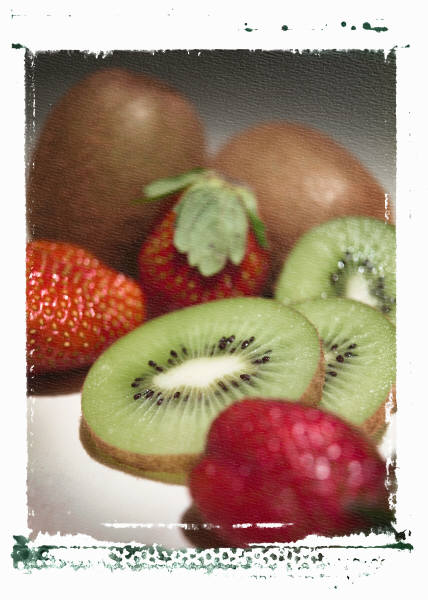We all know what a vegetarian is, but what’s a fruitarian? You may have guessed that a fruitarian is a person who chooses to eat only fruit. Some go as far to eat only fruit that has fallen naturally from a tree. By definition, a fruit is a seed-bearing portion of a plant. This includes tomatoes, avocadoes, olives and coconut, along with apples, berries, grapes, bananas, etc. There are species of monkeys and bats that obtain virtually all their nourishment from fruit. But even gorillas eat vegetables. I do realize that there are different types of fruitarians, just like there are some vegetarians who call themselves such even though they continue to eat fish (a meat). However, I am here to critique the most pure form of the fruitarian diet.
To be fair, allow me to first identify some positive attributes of the diet so you can understand its appeal to followers:
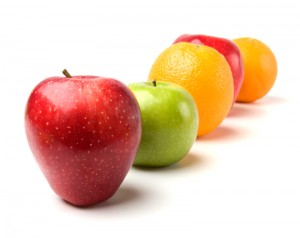 1. Fruits provide a good source of vitamin C, an essential nutrient humans cannot live without.
1. Fruits provide a good source of vitamin C, an essential nutrient humans cannot live without.
2. Fruits, when eaten in their raw state, are alkaline-forming, supporting a healthy blood and tissue pH.
3. Fruits are an excellent source of fibre.
Sounds appealing and healthy, right? However, anyone who has been convinced that humans can thrive solely on fruit is sadly, nutritionally ignorant. Do I recommend becoming a fruitarian? ABSOLUTELY NOT.
The fruitarian diet has to be one of the more ridiculous diets I have come across.
This diet is NOT sustainable; that is, one cannot survive on it healthfully for an indefinite period of time. Why not? You may ask. Here’s why any registered nutritionist, including myself should NEVER recommend a fruitarian diet:
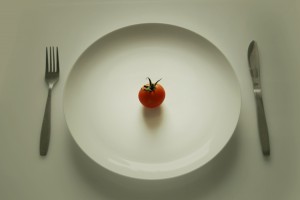 1. Fruit is virtually devoid of protein. Without protein, our muscles, including our heart muscle, will waste away. Those emaciated but pot-bellied children depicted in ‘help the hungry’ campaign ads with the caption “kwashiorkor” beneath look the way they do because they have severe protein deficiency. Kwashiorkor may seem like a far-fetched problem to westerners, but consider anemia: low hemoglobin which results in low oxygen- carrying capacity. Hemoglobin is made of protein, so without this essential nutrient one will become tired, lethargic and weak (just like the children with kwashiorkor). No matter how much starch or sugar is consumed, the body cannot turn carbohydrates into protein. Only amino acids—and enough of each essential amino acid in the right combination with the others—can build proteins. Unfortunately, fruit is a very, very poor source of amino acids. It is simply unrealistic to think one can eat enough fruit daily to obtain the protein required for building, cleansing and maintenance of the human body.
1. Fruit is virtually devoid of protein. Without protein, our muscles, including our heart muscle, will waste away. Those emaciated but pot-bellied children depicted in ‘help the hungry’ campaign ads with the caption “kwashiorkor” beneath look the way they do because they have severe protein deficiency. Kwashiorkor may seem like a far-fetched problem to westerners, but consider anemia: low hemoglobin which results in low oxygen- carrying capacity. Hemoglobin is made of protein, so without this essential nutrient one will become tired, lethargic and weak (just like the children with kwashiorkor). No matter how much starch or sugar is consumed, the body cannot turn carbohydrates into protein. Only amino acids—and enough of each essential amino acid in the right combination with the others—can build proteins. Unfortunately, fruit is a very, very poor source of amino acids. It is simply unrealistic to think one can eat enough fruit daily to obtain the protein required for building, cleansing and maintenance of the human body.
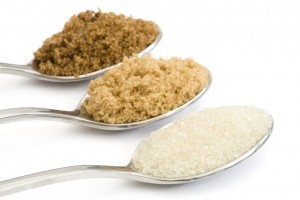 2. The amount of simple sugars in a fruitarian diet is dangerous, and for several reasons.
2. The amount of simple sugars in a fruitarian diet is dangerous, and for several reasons.
For one, fruits contain sugars that require little to no digestion. Therefore they enter the bloodstream very quickly. This places a high demand for insulin produced by the pancreas. In summary, a diet high is sugars (natural or not) will lead to dysglycemia— an imbalance in blood sugar levels. In some, this results in hypoglycemia (low blood sugar) symptoms like dizziness, sweating, anxiety and even fainting. In others, it leads to a diagnosis of diabetes (dangerously high blood sugar, causing damage to the arteries, nerves and brain).
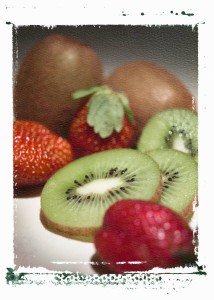
![]() Secondly, sugar feeds micro-organisms. While feeding your good intestinal flora sounds desirable, there undoubtedly are some nastier species of microbes down there that will feed on sugars, too. Yeasts and many varieties of pathogenic bacteria thrive on sugars, so a fruitarian diet is akin to a gravy train for these creatures. Gas, bloating, cramping and diarrhea can result from excess sugar consumption because they foster an over-abundance of the wrong microbes in the gut. Add to this the fact that sugars suppress immunity for up to 5 hours after ingestion, and you can see how a fruitarian diet could theoretically increase your risk of developing infections and feed the growth of cancerous tumours.
Secondly, sugar feeds micro-organisms. While feeding your good intestinal flora sounds desirable, there undoubtedly are some nastier species of microbes down there that will feed on sugars, too. Yeasts and many varieties of pathogenic bacteria thrive on sugars, so a fruitarian diet is akin to a gravy train for these creatures. Gas, bloating, cramping and diarrhea can result from excess sugar consumption because they foster an over-abundance of the wrong microbes in the gut. Add to this the fact that sugars suppress immunity for up to 5 hours after ingestion, and you can see how a fruitarian diet could theoretically increase your risk of developing infections and feed the growth of cancerous tumours.
3. A fruitarian diet is counter-productive in cold climates. Consider that the sweetest fruits (bananas, pineapple, mango) are found in the tropics, whereas the lower-sugar fruits (berries, apples) grow in climates where there is a snowy winter. Eating nothing but sugars sends the body the message to keep cool—which is the last thing those of us living in a cold climate needs.
4. The fruitarian diet is too low in essential fatty acids. While the body can manufacture saturated fats from excess consumed sugars, it cannot create essential fatty acids. This is why they are called ‘essential’. We must obtain them from food. You may have heard that coconut oil contains ‘healthy fats’. While this is true, realize the fats they contain are NOT the essential omega-3 or omega-6 in any appreciable quantity; they are saturated fats. Essential fatty acid deficiency is documented to result in numerous detrimental health effects, including mental impairment, skin afflictions, and reproductive hormone imbalances.
5. The fruitarian diet does not provide adequate amounts of essential minerals, like calcium and iron. While there are vegetables and nuts that contain impressive amounts of these nutrients, fruits are embarassingly low in them. Add these deficiencies to protein deficiency and you become a high risk candidate for osteoporosis, tooth decay and anemia, among other diseases.
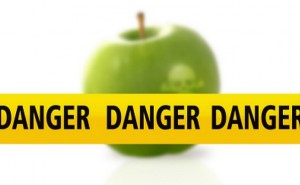 If I can help you avert the health disaster that can result from a fruitarian diet with this post then I will have accomplished my goal. Remember, even our ape-cousins eat a more varied diet than a fruitarian one when the opportunity presents itself!
If I can help you avert the health disaster that can result from a fruitarian diet with this post then I will have accomplished my goal. Remember, even our ape-cousins eat a more varied diet than a fruitarian one when the opportunity presents itself!
